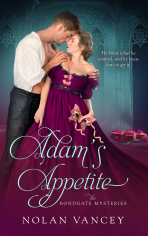Adam Blythewood could have hated Roderick Utley. Like Blythewood, Utley was a man who knew what he wanted and had the initiative and resources to take it. Worse yet, wherever Adam turned during his time at Windmere Hall and its environs, he found that Roderick had been there before him, laying claim to everything that Adam would have hoped to have for himself. In another time or under other circumstances, the two might have become deadly enemies. Fortunately for both of them, by the time Adam Blythewood was in a position to meet Roderick Utley, he had gained a mite of sympathy for his rival, and his own goals, indeed his very temperament, had changed.
On the day Adam arrived at Windmere Hall, a grey, featureless morning, he knew nothing of Roderick Utley. In fact, he had never even heard the name. After the long carriage ride from London to the rocky highlands of the West Country, he would have accepted lodgings much less grand than the estate that welcomed him at the end of his journey. The ride had provided solitude for him to ponder his position. No matter how he looked at it, this was exile, a last chance for him to redeem himself in his parents’ eyes before he would be cut off from his inheritance…a reprieve from the dire consequences of the path he had cut through London society before his father had engineered this abrupt departure. He had every reason to be chastened and humble, but like a keen hunter who could never quite give up the field, he took stock of every feminine creature he had encountered between the city and Windmere Hall.
Adam could not help himself. His interest in womanly companionship had long ago graduated from idle small talk in the parlour and holding hands while dancing to those pleasures that were by custom limited to marriage but in practice were frequently available by the night or by the hour, if one knew where and how to ask. The joys of Venus were the source of Adam’s greatest delights, but also his downfall.
So it was that Adam Blythewood, an inveterate rake, cad and seducer, found himself delivered to dwell as a guest at the manor of Lady Adonica Windmere, the widow of one of his father’s old Army friends. According to his father, Lady Windmere had only one son, close in age to Adam, a moral and upright young man whose influence, it was hoped, would rub off on him. Lady Windmere herself was, according to Colonel Blythewood, a stern, pious woman who would little tolerate Adam’s foolishness. In addition, Adam’s father had offered his son to Lady Windmere as a secretary, going through the Windmere family papers and organising them—Adam had little to say in the matter, of course. In this way, it was hoped that continuous work in the country would undo the bad habits that idleness in the city had bred in Adam.
Adam had sullenly acquiesced and prepared himself for a period of enforced celibacy and menial labour. He was neither old enough to take charge of his own fortune nor daring enough to break with his family entirely. Better to try to satisfy his father, for now. If this was as close to a monastery as he could manage to place him, so be it. Adam would have to make the best of it.
Adam’s first impression of Windmere Hall’s inhabitants did little to change his idea of the place. Gainesborough, the butler, was a man of many years and few words, lacking only a robe and tonsure to match exactly the mental picture of a monk that Adam had formed. As the old fellow led Adam through empty hallways that echoed with their footsteps, he informed Adam that the lady and her family had just finished their morning repast.
Gainesborough cleared his throat and opened the door after announcing his presence with a knock. For the first time, Adam felt hope that Windmere Hall might turn out to be a livelier place than he had been led to expect, for the parlour held five beautiful women. Once Gainesborough withdrew and closed the door behind him, Adam had them all to himself.
Sitting at the head of the room in a wing chair as if on a throne was a comely, finely attired woman. This was Lady Windmere, surely. Three maidens sat about the room, their attention on embroidery or reading until Adam walked in. Two of them, by appearances the youngest and oldest, looked up, the third staying focused on the novel she was reading. The eldest girl, tall with ravishing chestnut hair, blanched upon seeing Adam but quickly averted her gaze. The fifth woman was a maid in a neat black uniform. She was on her way out, carrying a tray and following the way Gainesborough had let Adam in.
Lady Windmere stood to take Adam’s hand. “Thank you for welcoming me into your home,” Adam said after they had exchanged pleasantries about his trip. “I look forward to meeting your son. I’m sure we will become the best of friends.” Adam was a little confused that the young man wasn’t present to welcome him, and even more so by the blank stares that returned to him from all four ladies.
“But Mr Blythewood, there must be some mistake,” Lady Windmere said. “I have no son.”
Adam half-smiled. Surely she was pulling his leg. “Am I not to understand that this is the home of Freddie Windmere?” he asked.
A ripple of amusement passed through the room and Lady Windmere rolled her eyes in sudden understanding. “Ah, ‘Freddie’ is what my late husband Sir Alfred called our eldest daughter.” She gestured to the maiden who had blanched at the sight of Adam—she was now somewhat recovered—and said, “Miss Frederica Windmere, Mr Adam Blythewood.”
Frederica stood and took Adam’s hand, curtseying as she did so. My, but she was charming! Now that she fully occupied his attention, Adam observed her tall, fine figure, her swelling bosom and the tasteful cascade of hair that draped her shoulders and neck. Still not quite believing his good fortune, he turned again to Lady Windmere and said, in what he hoped was a tone of regret, “So…there is no Alfred, Junior?”
Lady Windmere shook her head in resignation, and in that gesture Adam read twenty-odd years of having to explain the situation. “I hope that this will not spoil your plans to stay with us?” she said.
Inside him, a smouldering desire for Frederica began to kindle. It would certainly spoil his father’s plans to keep Adam away from the fairer sex, but he personally felt no disappointment at all. “I suppose I shall manage,” he said.
Lady Windmere introduced her other two daughters. The three young ladies had stood and lined up during the conversation, tall, medium and short. They made a handsome set, and each was pretty in her own way, although “Freddie” was the prize. Jane, the middle daughter who had been absorbed in her book the whole time, dressed modestly and kept her mousy brown hair wrapped tightly. She returned to her book after returning Adam’s greetings. Alice, the youngest and most petite in features, had long, pale blonde hair and pallid skin, like a porcelain figure. She looked Adam full in the eye, almost defiantly, while being introduced. There was something forceful about her presence, as if she were accustomed to making up for her size by will alone.
Adam had but a moment to admire the three sisters before Lady Windmere’s voice interrupted his train of thought. “Very well. You’ve already met Gainesborough—just ask him for anything that you need. As for the rest of the help, you need not learn their names. They are far too bold as it is. After you’ve settled in, Gainesborough will show you to the library.”
“Please, Mother,” Alice spoke up. “Could Jane and I show Mr Blythewood around the grounds? We can leave him at the library afterwards.”
“What a splendid idea. But I’m sure Mr Blythewood is tired from his journey.” She looked to him to provide the final verdict.
“I would love to see the grounds with such charming guides,” Adam said, “provided that Miss Windmere is able to join us. I wouldn’t want her to feel left out.” He showed her a smile that had proved winning in the past.
Although Frederica seemed to have adjusted to Adam’s presence, there was still an underlying stiffness in her manner as she replied, “That is most generous of you, Mr Blythewood. But I am afraid I have plans to occupy my time, and I am sure you will be in good hands with my sisters. Good day, sir.”
Adam bowed once more before Frederica departed so quickly that even Lady Windmere had not time to utter a dismissal. Adam wondered if he had been too forward, but Jane and Alice seemed to take no notice of their sister’s abrupt departure and were as eager as before to show him around. Their manner suggested that it was Frederica who had breached etiquette, not him.
“You mustn’t mind Freddie,” Alice said as the three of them crossed the lawn behind Windmere Hall. There was little to see from this angle but densely wooded forest and the rocky highlands that descended into cliffs along the shore. The sound of the ocean was audible, but it was too cool and misty to enjoy the sunshine very much. “You see, Father wanted a boy, and he raised Frederica as if she were one…riding, fencing, sailing, all that sort of thing.”
“But not you?”
“No.” Alice looked away towards the bleak cliffs. “Once he had Freddie, he didn’t… One picks up a few things by observing, of course, but…well—”
“He didn’t pay much attention to us either way,” Jane said. She still carried her book, tucked under one arm.
Adam made a sympathetic sound and nodded as if he understood. His own father had taken “Freddie” for Sir Alfred’s son, perhaps because Sir Alfred chose to frame the situation thusly, and he had no knowledge of Jane or Alice because Sir Alfred simply never mentioned them. It was a bit sad, or would have been if Adam didn’t personally yearn for a little less paternal oversight. He shrugged and said, “Fathers, hmm?”
Alice and Jane both nodded, each taking whatever meaning they chose, and the subject was dropped.
Contrary to Lady Windmere’s instructions, Adam learnt the names of many of the servants that afternoon. Jane and Alice knew them all, and stopped to engage in conversation with several of them, introducing Adam and showing off the features of the grounds. Dick, the groundskeeper, oversaw the planting and tending of lawn, garden, hedges, trees and so forth, and kept a pack of docile hounds who lazily patrolled the grounds. Sir Alfred had been an avid hunter, but that was the one outdoor activity in which he could never interest Frederica, so now the dogs were practically pets. Peter maintained the stables and carriages, supervising a handful of grooms and stable boys. Anne had recently married and had left her position, but Adam might encounter Susan and Samantha, if it were the right day, and on and on. The names and duties came so thick and fast that Adam could hardly keep up with who did what.
This friendliness mainly extended to the outdoor servants—Alice and Jane were instructed to be less familiar with the household help, at least within their mother’s hearing. Adam did pick up some useful information, however. Gainesborough had the reputation of a dirty old man, but he was harmless. Alice and Jane giggled at the mention of him. Adam learned that the pretty maid who served Lady Windmere was Marie—more giggling. The kitchen was staffed by—yet more giggling—until Adam was convinced that both sisters were far too silly to provide any useful information about the running of the house. The seriousness that marked Frederica’s character had apparently used up the entire family’s supply.
Adam knew better than to try to pick up hints about Frederica’s opinions and preferences directly. The first thing her sisters would do was run to tell her that the new gentleman had been asking all sorts of questions about her. Rather he asked them about themselves, deducing Frederica’s character from their answers.
Alice, at eighteen, seemed to revere her eldest sister, but from a distance, having little in common with her. Jane had a more clear-eyed view of things, even though she was apparently not very close with Frederica either. “Well, it’s no wonder she’s so frigid! She’s almost twenty-four, poor thing, with no prospects, except, well—”
“Except?” Adam said, noting the abruptness with which Jane stopped herself. But Jane said nothing else, silenced by a look from Alice.
Jane changed the subject to the library, which they were approaching, but it was too late—Adam had caught on to their secret. So Frederica had a paramour, eh? That didn’t change Adam’s intentions in the least—even the bonds of marriage had not stopped him in the past, he had to admit—but it was exactly the kind of information he needed to plan his attack, his “manoeuvres” as he and his chums used to say in school. Yes, his intentions were probably all too transparent to Jane and Alice, but so far he had said nothing that could be interpreted as too forward.
Gainesborough was waiting for them in the library when Jane and Alice were done with Adam. They departed, still giggling, as the butler began showing Adam where he was to begin, where his supplies could be found and so forth. A small writing desk had been procured and placed in the corner, along with ink, quills, fresh paper and other provisions. As Gainesborough talked, it became clear that the bulk of Adam’s work would be in organising and editing the memoirs and other personal papers of Sir Alfred, gone these past four years, as Lady Windmere hoped to present her late husband’s genealogical and historical work in published form, lest it be forgotten.
“It might be said, sir, that Sir Alfred was not the most organised of scholars—not by me,” he hastened to add, “but by those less charitable. He was a man of deeds rather than words, if you take my meaning. And of course the last person to attempt the feat—” To Adam’s raised eyes, Gainesborough cut himself off, much as Jane had done earlier.
“Tell me truthfully, Gainesborough—I am not the first person Lady Windmere has taken on to complete her husband’s manuscript, am I?” The butler’s stony silence was all the confirmation Adam needed. “And something happened to the prior editor?” Adam leafed idly through the pages that were stacked on the desk.
“I think you’ll find everything you need, sir,” Gainesborough said, then he hastily withdrew.
It must be understood that Adam Blythewood was not of a particularly scholarly bent himself. He had received a good education in English and Latin grammar and knew a smattering of French and Italian besides, and he had been told that his penmanship was excellent, but beyond that, he was not especially bookish or inclined to an interest in history, religion or art. Most of his reading had consisted of browsing illicit copies of Fanny Hill and the poetry of Catullus. But truth be told, this put him not that far behind many of the young men of his class and background, and as long as he satisfied his father’s demands enough to stay clear of ordination in the Church or a commission in the Army, he stood to make good use of what limited talents he had. He attacked Sir Alfred’s manuscript as if his life depended on it.
He began with an introductory essay Sir Alfred had composed on his illustrious forebears. True to Gainesborough’s words, the author was a rather poor stylist, with a clumsy prose manner and a limited vocabulary, but once Sir Alfred had warmed to his subject, he painted a clear enough picture of a family whose fortune extended back to the time of Elizabeth and had grown with the expansion of the Empire through shipping and trade. Sir Ambrose Windmere was the man who had truly made the Windmere name, and was the first Windmere to rise to knighthood. After building his fortune in speculation, he crowned his accomplishments by opening trade with the South Pacific island of—
Just as Adam had become absorbed in the story, however, he found that a page was missing. The pages had no numbers, so finding the loose sheet meant sifting through the entire stack to see if it had been put out of order, but nothing made sense when connected to the last page. He glanced at the other pile of papers stacked up beneath the desk and on the shelves next to it—sheaves of personal letters and correspondence, diaries and assorted certificates of title, presumably the primary sources Sir Alfred had relied on in composing his history—and despaired of finding the missing leaf in all that disorder.
Adam composed himself. He had a big task in front of him, and of course it would seem intimidating taken all at once. Better to pace himself—he took a piece of blank foolscap and inserted it into the manuscript, noting the missing page so he could come back to it later. Soon he had half a dozen such bookmarks poking from the stack. He furrowed his brow. How could there be so many gaps in a manuscript that had lain untouched for years? Then he remembered Gainesborough’s accidental hint. Someone else had been through the papers, perhaps a literary executor or another hireling Lady Windmere had brought in to finish the job, and for whatever reason, they had failed. Perhaps, if this is a sign of their level of organisation, they were dismissed, and rightly so.
Adam came to the end of the incomplete family history. After an hour or so of work, he was ready for a pause. Thwack! A sound from outside interrupted his reverie. Adam looked out of the window into the courtyard beneath. Miss Windmere stood with a bow and arrow, taking aim at a target. The arrow flew into it with the same thwack! he had heard before.
Well, well, thought Adam, leaning on the sill so he could enjoy the sight of Freddie’s archery practice. He was on the second floor and had a good view—Freddie wore a plain black dress with bare arms, allowing her to move freely. Her hair was casually tied up and her mind was clearly on her bow. Thwack! In this candid state, Adam found her even more alluring than before, and he could not deny the pleasurable shiver he got from spying on her unseen. There was something captivating about her mannish pursuits. Adam enjoyed visualising her as an Amazon warrior, one of Diana’s hunters, and he relished the thought of being in Actaeon’s position, even if it meant sharing his terrible fate.
Abruptly, his idyllic daydream came a little too close to reality. Glancing across the courtyard, he saw, or thought he saw, a pale face at the window opposite him. While he watched Freddie, someone else was watching him! In a flash the face—or shadow, whatever it was—disappeared, but in his surprise, he must have made a noise, for Freddie looked up and scowled upon recognising him. With the quickness of the goddess he had imagined her, she took aim straight at him and let the arrow fly.
Thwock! The missile stuck in the frame just outside with a bang that rattled the pane. Adam fell back in such a panic that it was only afterward he remembered the window was still closed. Would the glass have protected him from such a shot? He was glad he didn’t have to find out. What a woman! His heart still beating in his chest, he turned back to his desk, deciding he had taken enough of a break.












 Facebook
Facebook Twitter
Twitter